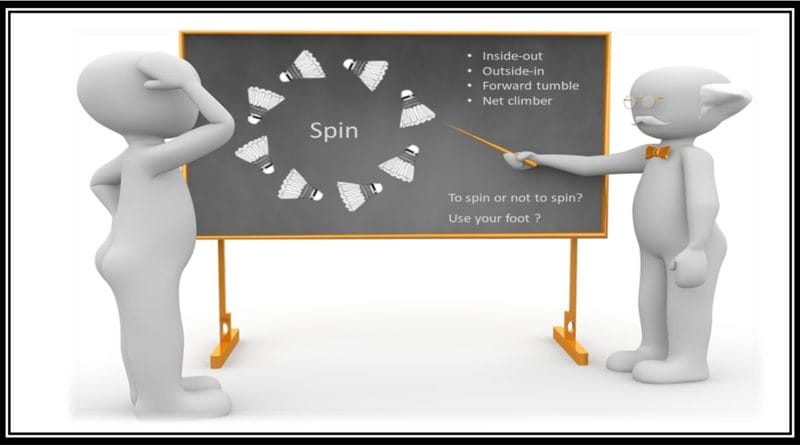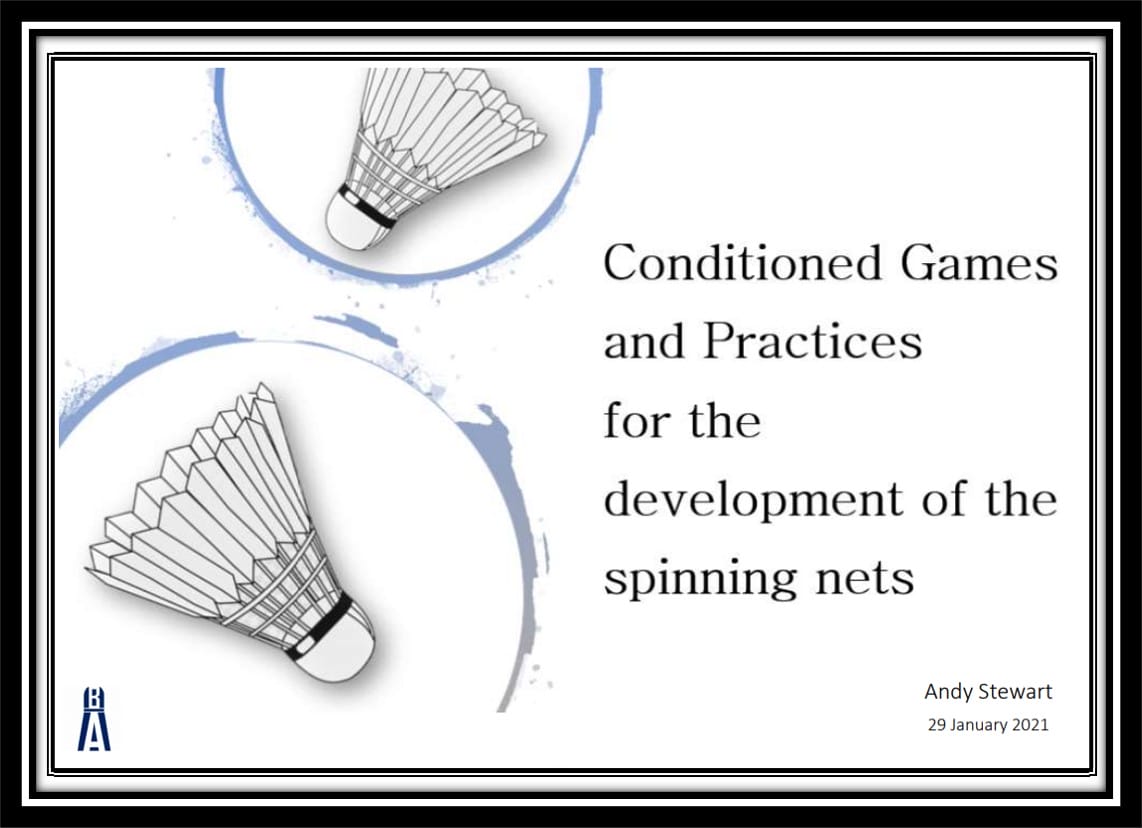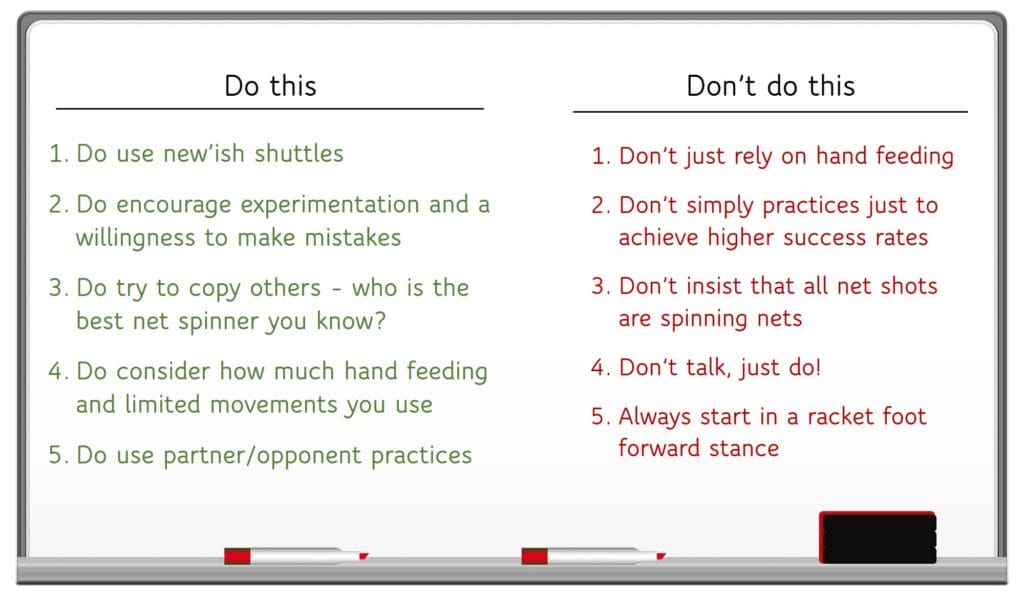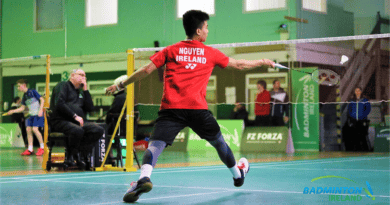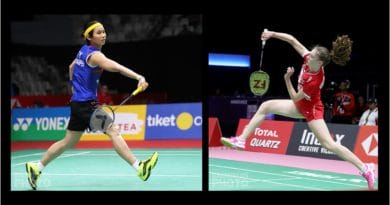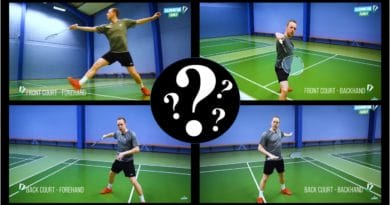Coaches guide to developing net spins
Developing net spins will test your coaching abilities
The process is exciting and sometimes mysterious
I hope that after reading this you will have some ideas to try
Your aim is to create technical ability but more importantly the tactics and strategies to use in competition
Hand-feeding for spinning nets is not the only to create development
There are more effective ways to prepare for net spins in competition
– – – – – – – – – – – – – – – –
1. General advice about practice
2. Other information to help
3. Working with novice players
4. Working with experts
5. Be prepared for these considerations & challenges
6. Dos and Don’ts
– – – – – – – – – – – – – – – –
1. General advice about practice
The practices you use are the key to development, not the amount of technical information you impart to players
- Create practices that enhance the opportunity for continued development and that create real game advantages.
- Lots of player input will be required, create experiences, challenge and ‘ego’
- Be careful about the amount of technical information that is given, rather just provide hints & tips
- Do talk with others coaches how their methods but remember the way coaches talk to coaches is NOT the same as the way Coaches talk with Players
The world of badminton is certainly full of viewpoints, opinions and sometimes strange practices.
You will meet people who have ideas of their own. Their advice may differ from mine.
You will have to navigate this yourself
In the beginning, it’s easy to make the shuttle spin
but difficult to reproduce exactly what you want
– – – – – – – – – – – – – – – –
2. Other information to help
Have you seen these two posts for more ideas and technical information?
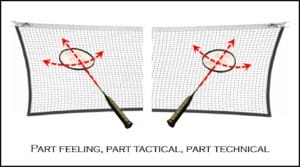
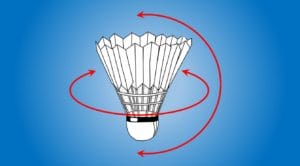
– – – – – – – – – – – – – – – –
This post will outline the approaches to take when working with players of different abilities
I recommend that you jump around when reading and look for the things you can try out with your players
– – – – – – – – – – – – – – – –
3. Working with novice players
Experiencing how a shuttle spins is essential for players, even during the first few interactions with our fantastic sport. Encourage a desire to see how many different ways the shuttle spins. The thrill and wonderment of this part of the game can easily last a lifetime.
Establish the idea that spins are exciting, be super positive in your coaching of them. In the beginning use practices that creat all types of spins. The ability to repeatable actions is not important.
I believe that there is no ‘right’ time to explore spins. However, there are certain aspects to take into account before you may decide to refine the skills that involve spinning. Ensure that you not only consider the technical information but you start to create tactical thoughts. It’s the combination of technical & tactical that will create the journey of ‘mastering’ net spins.
Early practices
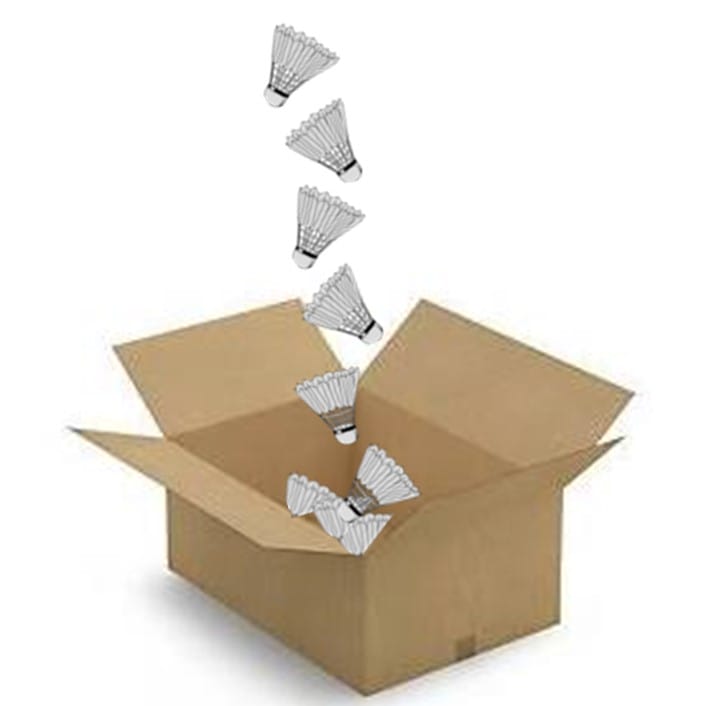
If you’ve read the previous post, you will have seen that I recommend starting without the net. If you want to read the post again click the image. Click on the image to read about the different practices you can try
How many fun and challenging games/tasks can you create from these headings?
Your coaching challenge is to think about the title then write 3 games/progressions for each that you could use with your players.
- Partner catch spins
- Spins into a box
- Spin it one way then find another
- Net games: how many variations do you use?
Establish core elements
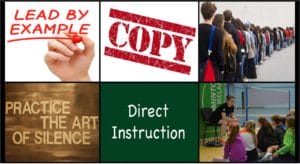
I recommend that all early practices incorporate these technical points. They don’t have to be given to your players verbally, why not demo them and ask the players to copy, or ask them to describe what they see. It’s really important that you create different ways to instil the technical aspects that you think are important.
- Striking and landing at the same time
- Lunging onto the racket leg
- Smaller than larger hand movements
- Step and pivoting body moments
Don’t discourage experimentation
When players first start discovering spins, it is often using that exact methods, discovery! 🙂
I’ve yet to find a player who learnt how to spin a shuttle without making many, many errors. The process of development is certainly not linear ie you improve little by little, progressing each day/month. It’s not from reading books or listening to a coach.
However, you can give yourself an advantage if you go onto the court and hit lots of different spins, play with others who have better spins, and watch videos. I’d encourage you to play lots of net games where bonus points are given for unreturnable spins.
– – – – – – – – – – – – – – – –
4 Working with experts
For most of us, there will come a time in your coaching when your player (pupil) develops skills equal or better than yours ( the coach). Well, that was always my aim and wish.
The challenge, therefore, is how to help someone with more advanced skills than yours.
Coaches need to become adept at finding ways to assist the development of experts in ways that do not involve always involve you being on the court with them. Sometimes by being on the court you may be reducing the effectiveness of the practice if all you can do is feed.
Hand-feeding is the traditional way of practising spins when coaches are on the court and there is a danger that experts will become great in practice at playing spins to hand feeds. Whilst this will establish proficiency in practice and start to reproduce the ‘required technique’ there is a danger of developing practice performance rather than game skill. How many times have you heard players talk about the practice they prefer when developing net spins and ask feeders to stand in a certain position and deliver the shuttle in a certain way.
The traditional next step is to move from hand-feeding into net games. Whilst I do support the use of nets games, especially with competitive elements, they are not always similar to the situations in real matches.
To develop experts, you will need more than hand-feeding and net games.
The way you design the practices, the difficulties you introduce, the suggestions you make, the questions and discussion you have …. that is coaching skill you can use
Ensure that practice is regular and varied including performance scenarios
Counter spins
Counter spins are really important and skill not often spoken about. All player’s and especially experts must learn to return spinning nets not just with lifts but counter spins returned back to the net. The ability to become great at performing these skills should be instilled into all experts.
They could be learnt through the coach hand spinning the shuttle however this isn’t the most effective methods.
Do you think a coach can spin the shuttle just as it flies in a competitive match? I’m sure they can make the shuttle spin but how realistic are your hand spins feeds compared to what happens in a match. Also, the ability is not just the technical aspect but knowing when to try a counter spin, and for that, you will need an opponent who plays with the intention of an opponent, not always a feeder.
I recommend that you make use of ‘partner practices’ detailed below
To master counter spins is a fantastic goal … are you working towards this?
Conditioned Games
Why not review and try out these conditioned games/practices. Click on the image or here.
They detail 3 games and practices to try. One is a partner/opponent based scenario.
Each one is a development from the previous and has increasing challenges and game-like possibilities. There is plenty for you to try out on the court with a range of player abilities. Plus each contains a section of questions to start a discussion between players and coaches or coaches and coaches.
I would be very grateful for any feedback or you could describe the games you use and I’ll publish them here for others to read.
Partner Practice
As often as possible I prefer players to practice net spins with other players. This is one of my favourite effective practices.
Don’t just have players hand feeding each other, create practices with elements of both cooperation and competition
The practice may look something like this
- Player A : blocks or pushes (like a serve) over the net that would land around the service line
- Player B : attempts to play a tight net from this push/block (initially without spin)
- Player A : moves forwards and spins
- (Player B : could try to return if the idea is to also practice return spins)
I know you may think that this practice sounds very simple but it’s more realistic than hand feeding as there are subtle variations contained within.
Player A can decide how fast or flat to serve/block. To which side of the opponent should be ‘feed’ (will the return be different). They could feed straight or crosscourt.
Player B could take it very early and return with a ‘fast net’ or hit a loopy ‘feed’. They could try to spin (even if they are away from the net). They could direct the net return away from the opponent making them adjust.
There are huge amounts of information and opportunities available when players practice together if you create the structure/rules. Not all of this will sound like coach instruction. Most of the valuable information can be seen or experience as they work together in these practices/challenges ????
Encourage players to practice with each other and at times make it tough for each other
Isn’t that what happens in a match 🙂
Information and experts: how much and when
This text may be seen as contradictory as elsewhere on this site I have often said that should consider the amount and type of information they impact to players.
If you are working with experts, you may need to discuss and impart information that previously you would not give to beginner and intermediate players. However, this isn’t necessarily the case for all expert players
Some experts will demand information, be prepared for that!. Many are generally better at being able to conceptualise information. I mean that they can extract usable elements to try out on the court. They can listen to stories, receive technical prompts or watch others. Their expert skill allows them to consider the information then act.
My recommendation is to be aware and flexible in your style of coaching and understand that information should be given. Allow the expert to request and take what they need.
Be prepared to offer information when asked, but be prepared to assess how much and how useable it is
– – – – – – – – – – – – – – – –
5. Be prepared for these considerations & challenges
- Being challenged by experts who use ‘ why questions’ concerning the practice, the information, the contractions and confusion they feel
- Coaches – are you prepared to back up what you say
- Some experts prefer to see and do rather than listen and discuss
- Coaches – how many different practices can you create that are realistic and help? What visuals can you present to the players?
- Experts are comfortable with a slower pace of development as they see it as refinement rather than step changes in performance
- Coaches are you prepared to stand back and let players work it out for themselves. It will take longer, but is that really a problem. Oh, and the number of errors may increase, but who is worried as practice is never perfect.
- Some experts will have forthright (almost certain/stubborn) viewpoints and a reluctance to change
- Coaches – sometimes don’t insist let experts decide and then reflect. Set up situations, games, scenarios where outcomes are not always predictable and may test their current thinking and techniques.
Obsession
Be aware that some experts can become obsessed with technique. Especially technical perfection in practice.
This can easily happen concerning strokes like net spins.
Wanting to improve and create awesome skills that you can perform on the court is not the issue. It’s great to have that desire. However, enjoying practising in a way that only seeks to improve practice performance and not include game-like stress and situations can lead to problems. Be careful if a great practice is defined as ‘error-free practice’.
It can be easy to create a practice where the sole intention is on a technical outcome. Be aware that to achieve this some experts will oversimplify their practices in order to achieve what looks like perfect performance, but how simply should practice be made just to increase the performance, especially when working with experts.
Be aware if the majority of the practices are simple ones in order to achieve a high degree of practice perfection
– – – – – – – – – – – – – – – –
6. Dos and Don’ts

Everyone will have an opinion on how to play and coach net spins, maybe more than any other specific stroke.
Listen to what others say, request confirmation from people you trust, look to see if it happens in a game, try it out with players.
– – – – – – – – – – – – – – – –
Have I missed anything it would be great to hear from you
I appreciate all your comments and suggestions, why not send me an email
contact@badmintonandy.com


